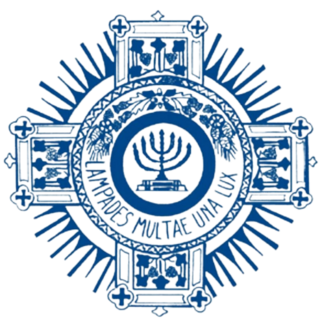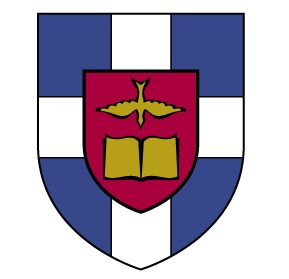
The Presbyterian Church (USA), abbreviated PCUSA, is a mainline Protestant denomination in the United States. It is the largest Presbyterian denomination in the country, known for its progressive stance on doctrine and its ordaining of women and members of the LGBT community as elders and ministers. The Presbyterian Church (USA) was established with the 1983 merger of the Presbyterian Church in the United States, whose churches were located in the Southern and border states, with the United Presbyterian Church in the United States of America, whose congregations could be found in every state.

The Presbyterian Church in America (PCA) is the second-largest Presbyterian church body, behind the Presbyterian Church (USA), and the largest conservative Calvinist denomination in the United States. The PCA is Reformed in theology and presbyterian in government.

The Cumberland Presbyterian Church is a Presbyterian denomination spawned by the Second Great Awakening. In 2019, it had 65,087 members and 673 congregations, of which 51 were located outside of the United States. The word Cumberland comes from the Cumberland River valley where the church was founded.

The Presbyterian Church in the United States was a Protestant denomination in the Southern and border states of the United States that existed from 1861 to 1983. That year, it merged with the United Presbyterian Church in the United States of America (UPCUSA) to form the Presbyterian Church (USA).

Union Presbyterian Seminary is a Presbyterian seminary in Richmond, Virginia, and Charlotte, North Carolina, offering graduate theological education in multiple modalities: in-person, hybrid, and online.
For graduate-level theological institutions, the Master of Divinity is the first professional degree of the pastoral profession in North America. It is the most common academic degree in seminaries and divinity schools.

Princeton Theological Seminary (PTSem), officially The Theological Seminary of the Presbyterian Church, is a private school of theology in Princeton, New Jersey. Founded in 1812 under the auspices of Archibald Alexander, the General Assembly of the Presbyterian Church (USA), and the College of New Jersey, it is the second-oldest seminary in the United States. It is also the largest of ten seminaries associated with the Presbyterian Church.

The Presbyterian Church in the United States of America (PCUSA) was a Presbyterian denomination existing from 1789 to 1958. In that year, the PCUSA merged with the United Presbyterian Church of North America. The new church was named the United Presbyterian Church in the United States of America. It was a predecessor to the contemporary Presbyterian Church (USA).
Andrew Purves is a Scottish theologian in the Reformed tradition through the Church of Scotland. He holds the Chair in Reformed Theology at Pittsburgh Theological Seminary.

Pittsburgh Theological Seminary (PTS) is a Presbyterian graduate seminary in Pittsburgh, Pennsylvania. Founded in 1794, it houses one of the largest theological libraries in the tri-state area.
Mid-America Reformed Seminary is a graduate-level theological institution located in Dyer, Indiana, providing a biblical and theological education in the classic Reformed (Calvinistic) tradition. The seminary offers a three-year Master of Divinity degree program for students seeking ordination. A two-year Master of Theological Studies degree is offered for students who desire a theological education without seeking the ordained ministry.

The Interdenominational Theological Center (ITC) is a consortium of five predominantly African-American denominational Christian seminaries in Atlanta, Georgia, operating together as a professional graduate school of theology. It is the largest free-standing African-American theological school in the United States.
Joan S. Gray was elected moderator of the Presbyterian Church (USA) at the 217th General Assembly on June 15, 2006. As moderator, she served as the presiding officer of the week-long General Assembly meeting in Birmingham, Alabama, followed by a two-year term as the ambassador-at-large for the denomination. She has also spent many years working in various churches and is currently serving as part of the faculty at Columbia Theological Seminary.

Louisville Presbyterian Theological Seminary, also referred to as Louisville Seminary, is a seminary affiliated with the Presbyterian Church (USA), located in Louisville, Kentucky. It is one of ten PC (USA) seminaries, and it identifies as an ecumenical seminary, with recent student enrollment representing many faith traditions.

The Southern Baptist Theological Seminary (SBTS) is a Baptist theological institute in Louisville, Kentucky. It is affiliated with the Southern Baptist Convention. The seminary was founded in 1859 in Greenville, South Carolina, where it was at first housed on the campus of Furman University. The seminary has been an innovator in theological education, establishing one of the first Ph.D. programs in religion in the year 1892. After being closed during the Civil War, it moved in 1877 to a newly built campus in downtown Louisville and moved to its current location in 1926 in the Crescent Hill neighborhood. In 1953, Southern became one of the few seminaries to offer a full, accredited degree course in church music. For more than fifty years Southern has been one of the world's largest theological seminaries, with an FTE enrollment of over 3,300 students in 2015.
The San Francisco Theological Seminary (SFTS) is a seminary in San Anselmo, California with historic ties to the Presbyterian Church (U.S.A.). SFTS became embedded in a new Graduate School of Theology of the University of Redlands in 2019. It was founded by the Synod of California in 1871.

The Old School–New School controversy was a schism of the Presbyterian Church in the United States of America which took place in 1837 and lasted for over 20 years. The Old School, led by Charles Hodge of Princeton Theological Seminary, was more conservative theologically and did not support the revival movement. It called for traditional Calvinist orthodoxy as outlined in the Westminster standards.
Nancy J. Duff is an American professor of theology. Duff worked as the Stephen Colwell Associate Professor of Christian Ethics at Princeton Theological Seminary, where she taught from 1990 until 2020. Duff is also a Presbyterian minister in the PCUSA denomination. She is married to United Methodist Minister David Mertz. She has taught courses on the Decalogue, Biomedical ethics, human sexuality, liturgy and the Christian life, Dietrich Bonhoeffer, James Cone, types of Christian ethics, and vocation in Christian tradition and contemporary life.
M. Craig Barnes is an American Presbyterian minister and professor who served as president of Princeton Theological Seminary.
Douglas W. Oldenburg was a Christian pastor and President Emeritus at Columbia Theological Seminary in the US. He served as the moderator of the 210th General Assembly of the Presbyterian Church (USA) in 1998.











